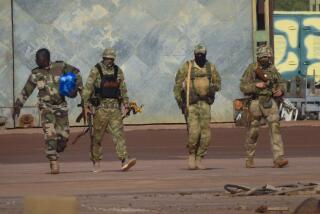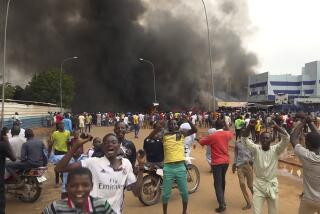Springtime Isn’t Forecast for Somalia, Nigeria, Sudan, Zimbabwe . . . : Africa: While we celebrate freedom in the East Bloc, tyranny holds much of another continent and is little noted.
- Share via
While “spring” breaks out in Eastern Europe, the harsh winter continues in black Africa. The most visible bloc of repressive nations is now poised to hand off that dubious distinction to sub-Sahara Africa. From all indications, shouldering this mantle doesn’t trouble Africa’s military and civilian dictators.
During the past few weeks, we have seen the impossible occur within the Warsaw Pact. Who can forget, as the Iron Curtain parted, the glow on the faces of millions of East Europeans emerging into the light of freedom. Who was not swept up by the euphoria of watching fellow human beings reach out and grab what was rightfully theirs: freedom to exercise their fundamental human rights.
From our vantage point, we joined in these celebrations and embraced those being ushered through the gates of freedom. We took time to reaffirm the endurance and inevitability of the spirit of democracy and stood in awe as the Cold War began to evolve into a relic of the past.
But if we were to turn south, away from the warmth of the December spring in Eastern Europe, we would be chilled by a cold wind of repression blowing through the tropics of Africa.
While the buds of democracy were dotting the Czechoslovakian landscape, the regime of Somali President Siad Barre was, according to a State Department report, bombing, shooting and bludgeoning its own citizens’ quest for freedom from tyranny. Those attempting to survive this carnage by fleeing across the border into Kenya were met, Africa Watch reported, by troops that forced them at gunpoint to return to Somalia, where many were executed or imprisoned. This was a far cry from the Hungarian and Czechoslovakian response to East Germans seeking safe passage to the West during the dawn of the democracy movement.
At the time that Sudan’s new military government was dismissing dozens of judges who objected to the violations of the rights of civilians facing trial in special military tribunals, Bulgarians were celebrating and congratulating one another for precipitating the fall of hard-line leader Todor Zhivkov.
In Poland, as the once-outlawed Solidarity was heading up a government that included members of the Communist Party, Zimbabwe President Robert Mugabe was stubbornly forging ahead in his pursuit of a one-party system. Mugabe was following a path charted by much of Africa’s current crop of dictators.
The Nigerian military government’s pronouncement that it felt compelled to postpone scheduled elections until it is satisfied that civilians can rule themselves, coincided with the dismantling of the feared internal security apparatuses of East Germany, Bulgaria and Czechoslovakia.
For many of Africa’s people, the unfolding drama in the East European theater is another reminder that the weather forecast for them is more of the same--cold, bitter winds of winter. Africans face terrible repression for even daring to exercise rights that one is endowed with by virtue of being human.
The possibility of an East Bloc-like spring in black Africa appears unlikely. There simply is no nation that is to black Africa what the Soviet Union is to Eastern Europe. Without Mikhail S. Gorbachev’s reformist zeal and notification that Soviet might would no longer be available to the leaders of the satellite states, chunks of the Berlin Wall may never have appeared on Wall Street.
Although African dictators have much in common, the sources of power that allow them to perpetuate their grip on “their” nations are fragmented. A number of tyrants are beholden to the French and British. Another group doff their military caps to the Soviets. Yet another group of “Presidents for Life” kowtow to the United States. Nearly every one of Africa’s dictators has a guardian angel who sees that they weather any crisis that threatens to loosen their hold on the levers of power.
It seemed just yesterday that Africans and Eastern Europeans were on the outside, faces pressed against the windows, watching others gorge themselves at the table of freedom and democracy. Today, room has been made at the table for the East Europeans. Glasses filled with that strong and full-bodied wine of freedom are raised in a salute.
But nobody inside appears to notice the figures at the window.
More to Read
Sign up for Essential California
The most important California stories and recommendations in your inbox every morning.
You may occasionally receive promotional content from the Los Angeles Times.












